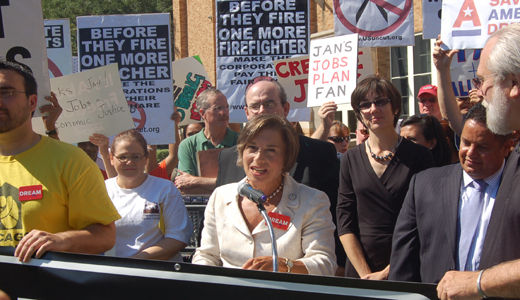
When President Obama presented his American Jobs Act, he brilliantly laid out the task and set the context. On Labor Day, he said, “We’ve got roads and bridges across this country that need rebuilding. We’ve got private companies with the equipment and the manpower to do the building. We’ve got more than one million unemployed construction workers ready to get dirty right now. There is work to be done and there are workers ready to do it.” Obama made the same points in his speech to the nation the following Thursday: “Pass this Jobs Bill,” he said repeatedly, to provide a great school to every American child, and build a world-class transportation system.
This is a clear contrast to the Republican agenda: deregulation, tax cuts for the rich, expansion of carbon-based energy. The GOP sugarcoats their right-wing, pro-corporate agenda by claiming it “creates jobs.” They attack things they don’t like — health care, decent wages and workers’ rights, government spending in the public interest — as “job killing.” They exploit legitimate frustration with inadequate, inefficient and corporate-oriented government to create a narrative that all government spending, government programs, and public workers are evil and the root of all our problems.
Obama challenged this anti-worker, corporate agenda: “But what we can’t do… is let this economic crisis be used as an excuse to wipe out the basic protections that Americans have counted on for decades,” he said. Obama added, “I reject the idea that we need to ask people to choose between their jobs and their safety. I reject the argument that says for the economy to grow, we have to roll back protections that ban hidden fees by credit card companies, or rules that keep our kids from being exposed to mercury, or laws that prevent the health insurance industry from shortchanging patients. I reject the idea that we have to strip away collective bargaining rights to compete in a global economy.”
Does Obama’s plan live up to his presentation? It is easy to pick out what the plan fails to accomplish, to view the glass as three-quarters empty rather than partly full. It doesn’t come close to meeting the full need for jobs, or to providing a program that would really meet the need for restored infrastructure, new transportation systems, quality schools for all, and green renewable energy. (See companion article for a detailed analysis of what is and is not in the plan.)
Our view should be shaped by the political context. Yes, there are better plans out there, ranging from Congresswoman Jan Schakowsky’s, D-Ill., more ambitious two-year infrastructure bill, to the Peoples Budget projected by the 75-member Congressional Progressive Caucus, to excellent recovery plans projected by the Economic Policy Institute, the labor movement, broad coalitions, and other organizations including the CPUSA.
But are any of these proposals on the verge of becoming reality? Is there a large section of the working class advanced enough in its thinking to demand these measures without being diverted? Is there the unity and organization necessary to put millions in the street, and even on strike, around a common set of demands? Can the size of the Congressional Progressive Caucus be doubled around support for their People’s Budget? Can the splendid unity, organization and militancy that was demonstrated this year in Wisconsin be duplicated on a national level?
If the answer to those questions were “yes,” then Obama’s plan could be seen as diverting the movement. After all, politicians and others in the past have used this tactic of conceding a little ground in order to avoid a more substantial victory for workers.
But the answer to most of those questions is “no.” President Obama is not in a position on his own to implement, and the mass movement is not in a position (yet) to demand, the “full glass” proposals. And focusing the weaknesses in the President’s plan will not help build that movement.
The general view from labor and progressive forces seems to be: the American Jobs Act is better than we expected, and although it does not do enough, it should be supported while pushing for more and better proposals.
For example, members of the Congressional Progressive Caucus are introducing legislation in support of its “rebuild the American dream framework” to rebuild America, revive manufacturing, provide jobs and training for youth, lead a “green industrial revolution,” introduce fair taxes on corporations and wealthy CEOs, and create, “not just jobs, but good jobs.”
As Isaiah Poole of OurFuture.org reports, “Progressive Caucus Chair Rep. Raul Grijalva (D-Ariz.) told a group of bloggers [that] by pushing a jobs agenda that in many respects is more aggressive that what the White House is proposing, ‘we believe we strengthen that agenda’ – and draw the contrast between progressive solutions to the jobs crisis and conservative legislators’ efforts to obstruct meaningful jobs legislation while defending tax breaks for millionaires and billionaires.”
Responses to Obama’s speech from labor and progressive leaders also seem to say, let’s run with the best parts of Obama’s proposals, while building support for the Schakowsky infrastructure bill and other measures that go further.
I agree with this approach. I don’t see a contradiction between promoting the elements of the Progressive Caucus’ framework, and supporting Obama’s jobs act. Focusing on the weak, or even the negative parts of the measure is diversionary at this time. We can and should acknowledge areas of disagreement — most notably in the inadequate scope of it, but also in the ineffective or even negative features of some provisions. But the best chance for getting anything passed (including the vital extension of unemployment benefits) is building a tidal wave in support of the package, and strengthening organizational structures so the wave can move beyond the jobs act to the additional actions and ideas that the President acknowledges will be needed.
Photo: Congresswoman Jan Schakowsky, D-Ill., announces her progressive jobs bill in Chicago. (PW file)

MOST POPULAR TODAY

High Court essentially bans demonstrations, freedom of assembly in Deep South

Resource wars rage in eastern Congo, but U.S. capitalism only sees investment opportunity

U.S. imperialism’s ‘ironclad’ support for Israel increases fascist danger at home

UN warns that Israel is still blocking humanitarian aid to Gaza







Comments